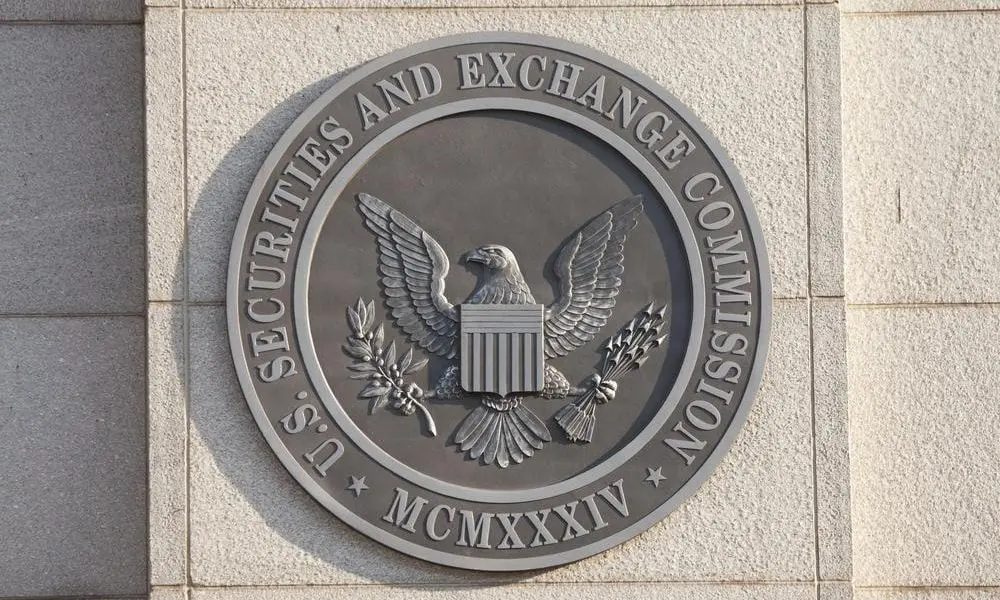Source: Mark Van Scyoc – Shutterstock
- Grayscale has written a letter to the SEC in which it argues that the agency is breaking the law by discriminating against Bitcoin spot ETFs while approving futures ETFs.
- The letter comes three weeks before the day that the SEC is expected to give its verdict on a Bitcoin spot ETF application by Grayscale.
After several rejections under Jay Clayton, the SEC finally approved a Bitcoin futures ETF this year under the new head, Gary Gensler. Curiously, it’s still adamant against a spot ETF, and Grayscale believes this could be a violation of a law that governs how federal agencies make their decisions.
The SEC has approved three Bitcoin ETFs this year, from Valkyrie, ProShares and VanEck. The ProShares Bitcoin Strategy ETF (ticker symbol BITO) was the first to be approved, and it was an instant success. It amassed $1 billion in assets under management in 2 days, a record in the U.S market. All three approved ETFs, however, are futures ETFs. The SEC has rejected all spot ETF applications, the latest being from VanEck in November.
Read More: ProShares Bitcoin ETF registers record trading volumes on debut, BTC price crosses $64,000
A futures ETF allows investors to speculate on the future price of an asset, in this case, Bitcoin through derivatives. A spot ETF, on the other hand, allows investors to trade on the current price of an asset. This makes it similar to holding this asset at any particular time.
Last night our attorneys at Davis Polk sent a letter to the SEC arguing that approval of #Bitcoin futures-based ETFs, but not #Bitcoin spot-based ETFs, like $GBTC, is “arbitrary and capricious,” and therefore in violation of the Administrative Procedure Act (APA).
— Craig Salm (@CraigSalm) November 30, 2021
Grayscale: SEC is violating the law by rejecting Bitcoin spot ETFs
Grayscale is taking an issue with this seeming discrimination against one product and the approval of a similar product. In a letter by Davis Polk & Wardwell LLP, the law firm representing the company, Grayscale argued that the SEC is playing favorites by allowing one and not the other. The agency is subjecting spot ETFs to “a different, vague and evidently impossible-to-meet standard.”
Doing so not only would be fundamentally unfair to BTC and its shareholders, but would violate the Section 6(b)(5) injunction against unfair discrimination among issuers, and constitute arbitrary and capricious administrative action in violation of the APA [Administrative Procedures Act].
The APA governs the process by which federal agencies, like the SEC, develop and issue regulations. It also applies to the issuance of policy statements, licenses and permits.
The SEC has based its rejections on the fine difference between the laws that apply to spot and futures ETFs. The two are governed primarily by the Securities Act of 1933 (’33 Act), but the latter has the additional oversight of the Company Act of 1940 (’40 Act). Gensler, in particular, has made it clear that this extra oversight is a key reason he approved one and not the other.
However, as Grayscale observes, the ’40 Act only applies to the issuer of the ETF, allowing the SEC to directly oversee the management of the product. But in rejecting the spot ETFs, the SEC has never cited the ability to oversee the issuers as the reason for the rejection. Rather, it has claimed it was because the cryptocurrency market is prone to manipulation.
Craig Salm, Grayscale’s Head of Legal further broke down the SEC’s mixed signals in a blog post.
Regarding the claim that the ‘40 Act has increased investor protections, I’d highlight that this law does not address fraud or manipulation in the assets or markets of assets that ETFs hold. […] The ‘40 Act even explicitly lists out the types of abuses it seeks to prevent, and places certain restrictions on ETFs related to accounting, borrowing, custody, fees, and independent boards, among others.
“SEC’s manipulation claims are baseless”
Craig also attacked the SEC’s manipulation claims. The agency claims that Bitcoin spot ETFs would be prone to manipulation, but yet approve futures ETFs that track the exact same underlying asset.
All the three approved Bitcoin ETFs hold futures contracts that trade on the Chicago Mercantile Exchange (CME), a marketplace regulated by the federal government. This, however, is not an argument against spot ETFs, Grayscale argues. After all, the spot ETFs that the SEC has rejected, all intend to track CME’s indexes and thus would trade at par with the futures ETFs.
If spot ETFs can be manipulated, then “someone could, in theory, manipulate bitcoin on a spot exchange and have it impact the regulated CME Bitcoin Futures and, therefore, the futures-based ETF too. (Again, assuming you believe fraud or manipulation exists in the first place),” Craig pointed out.
The lawyer concluded:
As it stands, the Bitcoin ETF landscape is unfair and discriminatory against GBTC shareholders and all of the other U.S. investors looking for an accessible and efficient way to gain their Bitcoin exposure.
Grayscale’s bold move to attack the SEC comes just three weeks before the agency reveals its decision regarding Grayscale’s Bitcoin spot ETF application. SEC earlier this year asked for public feedback on the ETF proposal and it’s expected to give its verdict on December 24. However, it would come as no surprise if the agency decided to extend the deadline, something it has done a lot of times in the past.
Grayscale, which holds about $37 billion in its GBTC Bitcoin trust, is making a risky move going against the regulator. Coinbase did this a few months ago, criticizing the SEC for cracking down on its Coinbase Lend product. However, just a few days later, the exchange mysteriously folded its plans and claimed to be working with the regulator.


